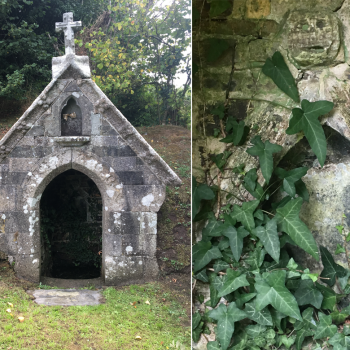When I go to my local interfaith meetings, several members use words of blessings specific to their particular religion to say hello or goodbye. Christians may say “God Bless You,” Muslims may say “As-salamu alaykum” (“Peace be with you”), and I might say “Blessed Be.” Some (but not all) Pagans use “Blessed Be” to say hello and goodbye, to bless people or offerings during a ritual, and to express sympathy and support for fellow Pagans going through difficult times.
“Blessed Be” may have Christian origins, but on analysis it reveals some rather intriguing things that might explain why many Pagans find it an appealing greeting.

First, let’s look at the Christian “God Bless You.” Grammatically I think it is a form of the subjunctive mood, short for something like “I wish for God to bless you.” It’s basically expressing a hope that God keeps the other person safe and delivers their needs.
But “Blessed Be” is little more vague. In terms of grammar, it’s rather tricky. The “blessed” is a participle, i.e. a verb functioning as an adjective to modify a noun, and is always pronounced with two syllables, “bless-ed.” But the “be” in this case, as an infinitive with no subject, turns the sentence into an imperative, i.e. a command, “Be Blessed!” like “Be Happy!” (putting the verb at the end gives it a feeling of poetic antiquity).
I find there’s two significant points here. The first is that, unlike “God Bless You,” there’s no apparent entity doing the blessing in “Blessed Be.” No God, nor even Goddess. The expression just wishes blessings upon someone, from a non-specific source. This seems to fit Paganism very well; with such a variety of deities, and indeed with some forms of Paganism and witchcraft having no deities at all, wishing blessings upon another without reference to where those blessings are coming from would be appropriate for any Pagan, no matter what their individual creed.
Secondly, the imperative form of the sentence leads to another interesting implication. It’s not saying “Deities, please bless this person,” but rather, it’s saying directly to the person, “Please be blessed!” It’s as if that person has the power to make themselves blessed. In many forms of Paganism, this isn’t far from the truth. Pagan paths that focus on one’s inner power, especially magical paths, emphasise that the deities are imminent and within us, and that we are a part of them. It is this inner power that enables people to change reality, in what is usually known as “magic.” In this interpretation, wishing a person “Blessed Be” is like saying, “Be happy!” – it is willing for good things to happen to them. And within most witchcraft traditions, willing something is the basis for magic. Both the person saying the phrase “Blessed Be,” and the person to whom it is being said, have that power to make themselves and others blessed.
In this way, Blessed Be is a very empowering statement; saying it with sincerity is literally a magical and spiritual act. Don’t be shy to use it!
















